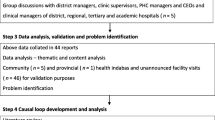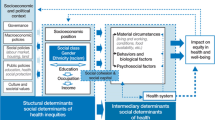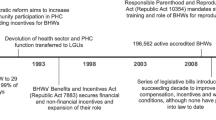Abstract
Background
Children in Sub-Saharan Africa (SSA) experience high rates of mental health problems, and the region has limited access to mental health resources and research capacity to address the needs. Despite the success of numerous evidence-based interventions (EBIs) and emerging methodology from the field of implementation science for addressing child mental health needs, most EBIs and implementation science methodology have not been applied in SSA contexts. The SMART-Africa Center aims to address these child welfare, mental health, services, and EBI implementation research gaps by establishing a regional trans-disciplinary collaborative center and studying strategies to strengthening mental health system and implementation research capacity. Our paper describes the overall framework and strategies that SMART-Africa team developed to strengthen capacity in three SSA countries (Ghana, Kenya, and Uganda) while focusing on its contextualization for the Kenyan school-community mental health settings. Methods to document the progress and impacts are also described.
Methods
The design of the system and research strengthening activities is guided by a SMART-Africa Capacity Building framework. Two areas of capacity are focused. Mental health system capacity focuses on building political wills, leadership, transdisciplinary partnership, and stakeholders’ global competency in evidence child mental health policy, intervention, and service implementation research. Implementation research capacity building focuses on building researchers’ implementation research competency by carrying out an EBI implementation research (using a Hybrid Type II effectiveness-implementation). For illustration purpose, we describe how the system strengthening strategies has been applied in Kenya and how the mixed methods design applied to assess the value and impacts of the capacity building activities. Feedback data and evaluation data collection using qualitative and quantitative methods for both areas of capacity building are still ongoing. Data will be analyzed and compared across countries in 2020–2021.
Conclusion
Our work has shown some feasibility of applying the theory-guided system strengthening model in improving child mental health service system and research capacity in one of the three SMART-Africa partnering countries. Our mental health landscape and resource mapping in Kenya also illustrated that capacity building in SSA countries involved complex dynamic, history, and some overlap efforts with multiple partnerships, and these are critical to consider in training activity and evaluation design.

Similar content being viewed by others
Data Availability
The evaluation data collection is ongoing and not yet complete.
The content is solely the responsibility of the authors and does not necessarily represent the official views of the NIMH or the National Institutes of Health.
Abbreviations
- SSA:
-
Sub-Saharan Africa
- EBI:
-
Evidence-based interventions
- RE-AIM:
-
Reach, Effectiveness, Adoption, Implementation, and Maintenance
- MNS:
-
Mental, neurological, and substance use
- WHO:
-
World Health Organization
- MFG:
-
Multiple Family Groups
- DBD:
-
Disruptive behavioral disorders
References
Aarons, G. A., Hurlburt, M., & Horwitz, S. M. (2011). Advancing a conceptual model of evidence-based practice implementation in public service sectors. Administration and Policy in Mental Health, 38(1), 4–23. https://doi.org/10.1007/s10488-010-0327-7.
Abdulmalik, J., Fadahunsi, W., Kola, L., Nwefoh, E., Minas, H., Eaton, J., & Gureje, O. (2014). The mental health leadership and advocacy program (nhLAP): a pioneering response to the neglect of mental health in Anglophone West Africa International Journal of Mental Health System, 8.
AFFIRM. (2013). AFrica focus on intervnetion research for mental health. Retrieved from http://www.affirm.uct.ac.za/
Apkan, M. U., & N.C., O., & E., E. . (2010). Behavioral problems among schoolchildren in Nigeria. South African Journal of Psychiatry, 16, 50–55.
Ashenafi, Y., Kebede, D., Desta, M., & Alem, A. (2001). Prevalence of mental and behavioural disorders in Ethiopia. East African Medical Journal, 78, 308–311.
Atwoli, L. (2013). Mental Health Priorities for Kenya 2013. Retrieved from http://www.wambuiwaithaka.com/mental-health-priorities-for-kenya-2013/
Baumann, A. A., Powell, B. J., Kohl, P. L., Tabak, R. G., Penalba, V., Proctor, E. K., & Cabassa, L. J. (2015). Cultural adaptation and implementation of evidence-based parent-training: a systematic review and critique of guiding evidence. Children and Youth Services Review, 53, 113–120.
Bhana, A., McKay, M. M., Mellins, C., Petersen, I., & Bell, C. (2010). Family-based HIV prevention and intervention services for youth living in poverty-affected contexts: the CHAMP model of collaborative, evidence-informed programme development. Journal of the International AIDS Society, 13(Suppl 2), S8. https://doi.org/10.1186/1758-2652-13-s2-s8.
Bhana, A., Mellins, C. A., Petersen, I., Alicea, S., Myeza, N., Holst, H., & McKay, M. (2014). The VUKA family program: piloting a family-based psychosocial intervention to promote health and mental health among HIV infected early adolescents in South Africa. AIDS care, 26(1), 1–11. https://doi.org/10.1080/09540121.2013.806770.
Breuer, E., De Silva, M. J., Fekadu, A., Luitel, N. P., Murhar, V., Nakku, J., . . . Lund, C. (2014). Using workshops to develop theories of change in five low and middle income countries: lessons from the programme for improving mental health care (PRIME). International Journal of Mental Health System, 8: 15. Retrieved from http://www.ijmhs.com/content/pdf/1752-4458-8-15.pdf
Center for Global Mental Health. (2011). PRIME: Programme for Improving Mental health care. Retrieved from http://www.centreforglobalmentalhealth.org/projects-research/prime-programme-improving-mental-health-care
CFIR Research Team. (2014). Consolidated framework for implementation research: CFIR constructs. Retrieved from http://cfirguide.org/constructs.html
Chacko, A., Gopalan, G., Franco, L., Dean-Assael, K., Jackson, J., & Marcus, S. (2015). Multiple family group service model for children with disruptive behavior disorders: child outcomes at post-treatment. Journal of Emotional and Behavioral Disorders, 23, 67–77.
Cortina, M. A., Sodha, A., Fazel, M., & Ramchandani, P. G. (2012). Prevalence of child mental health problems in Sub-Saharan Africa: a systematic review. Archives of Pediatric and Adolescent Medicine, 166, 276–281.
Curran, G. M., Bauer, M., Mittman, B., Pyne, J. M., & Stetler , C. (2012). Effectiveness implementation hybrid designs: combining elements of clinical effectiveness and implementation research to enhance public health impact. Medical Care, 50, 217–226.
Daar, A. S., Jacobs, M., Wall, S., Groenewald, J., Eaton, J., Patel, V., & Ndetei, D. (2014). Declaration on mental health in Africa: moving to implementation. Global Health Action, 7, 24589. https://doi.org/10.3402/gha.v7.24589.
Doku, V. C. K., Wusu-Takyi, A., & Awakame, J. (2012). Implementing the metal health act in Chana: any challenges ahead? Ghana Medical Journal, 46, 241–250.
Erskine, H. E., Moffitt, T. E., Copeland, W. E., Costello, E. J., Ferrari, A. J., Patton, G., & al., e. . (2015). A heavy burden on young minds: the global burden of mental and substance use disorders in children and youth. Psychological Medicine, 45, 1551–1563.
Francis, O., Odwe, G., & Birungi, H. (2016). Adolescent sexual and reproductive health situation in Kenya: insights from the 2014 Kenya demographic and health survey. Retrieved from https://www.popcouncil.org/uploads/pdfs/2016STEPUP_AdolSRH-KenyaDHS.pdf
Gardner, F., Montgomery, P., & Knerr, W. (2015). Transporting evidence-based parenting programs for child problem behavior (age 3–10) between countries: systematic review and meta-analysis. Journal of Clinical Child & Adolescent Psychology, 18, 1–14. Retrieved from http://www.ncbi.nlm.nih.gov/pubmed/25785902
GBD 2017 Disease and Injury Incidence and Prevalence Collaborators. (2018). Global, regional, and national incidence, prevalence, and years lived with disability for 354 diseases and injuries for 195 countries and territories, 1990–2017: a systematic analysis for the Global Burden of Disease Study 2017. Lancet, 392(10159), 1789–1858. https://doi.org/10.1016/s0140-6736(18)32279-7.
Glasgow, R. E., Vogt, T. M., & Boles, S. M. (1999). Evaluating the public health impact of health promotion interventions: the RE-AIM framework. American Journal of Public Health, 89, 1322–1327.
Gopalan, G., Bornheimer, L. A., Acri, M. C., Winters, A., O’Brien, K. H., Chacko, A., & McKay, M. M. (2018). Multiple family group service delivery model for children with disruptive behavior disorders: Impact on caregiver stress and depressive symptoms. Journal of Emotional and Behavioral Disorders, 26(3), 182–192. https://doi.org/10.1177/1063426617717721.
Gopalan, G., Chacko, A., Franco, L., Dean-Assael, K., Rotko, L., & Marcus, S. (2014). Multiple family group service delivery model for youth with disruptive behaviors: child outcomes at 6 month follow-up. Journal of Child and Family Studies, 24, 2721–2733.
Gureje, O., Seedat, S., Kola, L., Appiah-Poku, J., Othieno, C., Harris, B., & Esan, O. (2019). Partnership for mental health development in Sub-Saharan Africa (PaM-D): a collaborative initiative for research and capacity building. Epidemiology and Psychiatric Sciences, 28(4), 389–396. https://doi.org/10.1017/s2045796018000707.
Henry, D. (2006). Violence and the body: somatic expressions of trauma and vulnerability during war. Med Anthropol Q, 20(3), 379–398. Retrieved from http://www.ncbi.nlm.nih.gov/entrez/query.fcgi?cmd=Retrieve&db=PubMed&dopt=Citation&list_uids=16937622
Huang, K. Y., Bornheimer, L. A., Dankyi, E., & de-Graft Aikins, A. . (2018). Parental wellbeing, parenting and child development in ghanaian families with young children. Child Psychiatry and Human Development, 49(5), 833–841. https://doi.org/10.1007/s10578-018-0799-3.
Huang, K. Y., Cheng, S., Gathibandhe, R., Bauta, B. H., & Akena, D. H. (2016). Non Communicable Diseases (NCDs) and Mental Health in Africa In A. de-Graft Aikins & C. Agyemang (Eds.), Chronic Non-Communicable Diseases in Low and Middle Income Countries: Synthesis of Research, Interventions and Policies. Oxon, UK: CABI
Huang, K. Y., Nakigudde, J., Ruhule, D., Gumikiriza, J. L., Abura, G., Kolawole, B., & Brotman, L. M. (2017). Transportability of an evidence-based early childhood intervention in a low-income African country: results of a cluster randomized controlled implementation study. Prevention Science, 18, 964–975.
Ireri, N. W., White, S. W., & Mbwayo, A. W. (2019). Treating anxiety and social deficits in children with autism spectrum disorder in two schools in Nairobi, Kenya. Journal of Autism and Developmental Disorders, 49(8), 3309–3315. https://doi.org/10.1007/s10803-019-04045-6.
Jenkins, R., Kiima, D., Njenga, F., Okonji, M., Kingora, J., Kathuku, D., & Lock, S. (2010). Integration of mental health into primary care in Kenya. World Psychiatry, 9(2), 118–120. https://doi.org/10.1002/j.2051-5545.2010.tb00289.x.
Jenkins, R., Othieno, C., Okeyo, S., Aruwa, J., Kingora, J., & Jenkins, B. (2013). Health system challenges to integration of mental health delivery in primary care in Kenya—perspectives of primary care health workers. BMC Health Services Research, 13, 368. https://doi.org/10.1186/1472-6963-13-368.
Kamau, J. W., Omigbodun, O. O., Bella-Awusah, T., & Adedokun, B. (2017). Who seeks child and adolescent mental health care in Kenya? A descriptive clinic profile at a tertiary referral facility. Child and Adolescent Psychiatry and Mental Health, 11, 14. https://doi.org/10.1186/s13034-017-0151-x.
Khasakhala, L. I., Ndetei, D. M., & Mathai, M. (2013). Suicidal behaviour among youths associated with psychopathology in both parents and youths attending outpatient psychiatric clinic in Kenya. Annals of General Psychiatry, 12(1), 13. https://doi.org/10.1186/1744-859x-12-13.
Kiburi, S. K., Molebatsi, K., Obondo, A., & Kuria, M. W. (2018). Adverse childhood experiences among patients with substance use disorders at a referral psychiatric hospital in Kenya. BMC Psychiatry, 18(1), 197. https://doi.org/10.1186/s12888-018-1780-1.
Kigozi, F., Ssebunnya, J., Kizza, D., Cooper, S., Ndyanabangi, S., & the Mental Health and Poverty Project. (2010). An overview of Uganda’s mental health care system: results from an assessment using the world health organization's assessment instrument for mental health system (WHO-AIMS). International Journal of Mental Health System, 4(1), 1–9. Retrieved from http://www.ijmhs.com/content/pdf/1752-4458-4-1.pdf
Kiima, D., & Jenkins, R. (2010). Mental health policy in Kenya -an integrated approach to scaling up equitable care for poor populations. International Journal of Mental Health Systems, 4, 19. https://doi.org/10.1186/1752-4458-4-19.
Kleintjes, S., Lund, C., Flisher, A. J., & MHaPP Research Programme Consortium. (2010). A situational analysis of child and adolescent mental health services in Ghana, Uganda, South Africa and Zambia. African Journal of Psychiatry, 13, 132–139.
KNBS. (2019). Kenya National Bureau of Statistics. Retrieved from https://www.knbs.or.ke/?page_id=3142
Koon, A. D., Conrad, A., Naimoli, J. F., Saxena, S., Connor, C., & Rodriguez, D. C. (2019). Implementing health system strengthening projects at USAID: findings from five cases using an integrated framework. Global Public Health, 1, 18. https://doi.org/10.1080/17441692.2019.1622758.
Kumar, M., & Sensoy Bahar, O. (2019). Introduction to the issue on equity, collaboration, and empowerment in mental health research partnerships. Global Social Welfare, 6(3), 141–144. https://doi.org/10.1007/s40609-019-00159-y.
Magai, D. N., Malik, J. A., & Koot, H. M. (2018). Emotional and behavioral problems in children and adolescents in central Kenya. Child Psychiatry and Human Development, 49(4), 659–671. https://doi.org/10.1007/s10578-018-0783-y.
Masseli, D., Lys, J.-A., & Schmid, J. (2005) Improving impacts of research partnerships. In. Bern: Swiss Commission for Research Partnerships with Developing Countries (KFPE).
Mathai, M., Stoep, A. V., Kumar, M., Kuria, M., Obondo, A., Kimani, V., & Rao, D. (2019). Building mental health research capacity in Kenya: a South-North collaboration. Glob Soc Welf, 6(3), 177–188. https://doi.org/10.1007/s40609-018-0126-8.
Mbwayo, A. W., & Mathai, M. (2016). Association between hopelessness and conduct problem among school going adolescents in a rural and urban setting in Kenya. Journal of Child and Adolescent Behaviour, 4(3). doi:https://doi.org/10.4172/2375-4494.1000291
Mbwayo, A. W., Mathai, M., Harder, V. S., Nicodimos, S., & Vander Stoep, A. (2019). Trauma among Kenyan school children in urban and rural settings: PTSD prevalence and correlates. Journal of Child & Adolescent Trauma. https://doi.org/10.1007/s40653-019-00256-2.
Mbwayo, A. W., Mathai, M., Khasakhala, L. I., Kuria, M. W., & Vander Stoep, A. (2019). Mental health in Kenyan schools: teachers’ perspectives. Global Social Welfare. https://doi.org/10.1007/s40609-019-00153-4.
MOH Kenya. (2015). Kenya mental health policy 2015–2030. Retrieved from http://publications.universalhealth2030.org/uploads/Kenya-Mental-Health-Policy.pdf
Monroe-Wise, A., Kibore, M., Kiarie, J., Nduati, R., Mburu, J., Drake, F. T., & Farquhar, C. (2014). The Clinical Education Partnership Initiative: an innovative approach to global health education. BMC Medical Education, 14, 1043. https://doi.org/10.1186/s12909-014-0246-5.
Murray, C. J., Vos, T., Lozano, R., Naghavi, M., Flaxman, A. D., & Michaud, C. (2013). Disability-adjusted life years (DALYs) for 291 diseases and injuries in 21 regions, 1990–2010: a systematic analysis for the Global Burden of Disease Study 2010. Lancet, 380, 2197–2223.
Nakigudde, J., Bauta, B., Wolf, S., & Huang, K. Y. (2016). Screening child social emotional and behavioral functioning in low-income country contexts. Jacobs Journal of Psychiatry and Behavioral Science, 2, 016. Retrieved from http://psychiatry.jacobspublishers.com/images/Psychiatry/J_J_Psych_Behav_Sci_2_2_016.pdf
NIH Fogarty International Center. (2019). Medical Education Partnership Initiative(MEPI) Retrieved from https://www.fic.nih.gov/Programs/Pages/medical-education-africa.aspx
O’Neil, A., Jacka, F. N., Cocker, F., Taylor, C. B., Odldenburg, B., & Berk, M. (2015). A shared framework for the common mental disorders and Non-communicable disease: key considerations for disease prevention and control. BMC Psychiatry. https://doi.org/10.1186/s12888-015-0394-0.
Omar, M. A., Green, A. T., Bird, P. K., Mirzoev, T., Flisher, A. J., Kigozi, F., Poverty Research Programme, C. (2010). Mental health policy process: a comparative study of Ghana, South Africa, Uganda and Zambia. International Journal of Mental Health Systems, 4, 24. https://doi.org/10.1186/1752-4458-4-24.
Ongeri, L., McCulloch, C. E., Neylan, T. C., Bukusi, E., Macfarlane, S. B., Othieno, C., & Meffert, S. M. (2018). Suicidality and associated risk factors in outpatients attending a general medical facility in rural Kenya. Journal of Affective Disorders, 225, 413–421. https://doi.org/10.1016/j.jad.2017.08.059.
Osok, J., Kigamwa, P., Stoep, A. V., Huang, K. Y., & Kumar, M. (2018). Depression and its psychosocial risk factors in pregnant Kenyan adolescents: a cross-sectional study in a community health Centre of Nairobi. BMC Psychiatry, 18(1), 136. https://doi.org/10.1186/s12888-018-1706-y.
Othieno, C. J., Kitazi, N., Mburu, J., Obondo, A., Mathai, M. A., & Loewenson, R. (2009). Use of participatory, action and research methods in enhancing awareness of mental disorders in Kariobangi. Kenya. Int Psychiatry, 6(1), 18–20.
Peters, A. T., Jacobs, R. H., Feldhaus, C., Henry, D. B., Albano, A. M., Langenecker, S. A., & Curry, J. F. (2016). Trajectories of functioning into emerging adulthood following treatment for adolescent depression. Journal of Adolescent Health, 58(3), 253–259. https://doi.org/10.1016/j.jadohealth.2015.09.022.
PRIME. (2015). PRIME theory of change maps. Retrieved from http://www.prime.uct.ac.za/toc
R4D. (2015). The Mental Health and Poverty Project: mental health policy development and implementation in four African countries (2005=2010). Retrieved from http://r4d.dfid.gov.uk/Project/50165/
Roberts, M., Mogan, C., & Asare, J. B. (2014). An overview of Ghana’s mental health system: results from an assessment using the World Health Organization’s Assessment Instrument for Mental Health Systems (WHO-AIMS). International Journal of Mental Health Systems, 8, 16. https://doi.org/10.1186/1752-4458-8-16.
Semrau, M., Lempp, H., Keynejad, R., Evans-Lacko, S., Mugisha, J., Raja, S., & Hanlon, C. (2016). Service user and caregiver involvement in mental health system strengthening in low- and middle-income countries: systematic review. BMC Health Services Research, 16, 79. https://doi.org/10.1186/s12913-016-1323-8.
Ssewamala, F. M., Sensoy Bahar, O., McKay, M. M., Hoagwood, K., Huang, K. Y., & Pringle, B. (2018). Strengthening mental health and research training in Sub-Saharan Africa (SMART Africa): Uganda study protocol. Trials, 19(1), 423. https://doi.org/10.1186/s13063-018-2751-z.
UCH Ibadan. (2015). Mental Health Leadership and Advocacy Programme (mhLAP). Retrieved from http://www.mhlap.org/
UNFPA Kenya Country Office. (2013). Kenya population situation analysis. Retrieved from https://www.unfpa.org/sites/default/files/admin-resource/FINALPSAREPORT_0.pdf
UNICEF. (2012). UNICEF Annual Report 2012 for Kenya, ESARO. Retrieved from http://www.unicef.org/about/annualreport/files/Kenya_COAR_2012.pdf
UNICEF. (2013). Kenya Statistics. Retrieved from https://www.unicef.org/infobycountry/kenya_statistics.html
United Nations Population Fund (UNFPA). (2014). The power of 1.8 billion: adolescents, youth and the transformation of the future. State of the world population 2014. Retrieved from https://www.unfpa.org/sites/default/files/pub-pdf/EN-SWOP14-Report_FINAL-web.pdf
Walsh, W. A., Dawson, J., & Mattingly, M. J. (2010). How are we measuring resilience following childhood maltreatment? Is the research adequate and consistent? What is the impact on research, practice, and policy? Trauma Violence Abuse, 11(1), 27–41. https://doi.org/10.1177/1524838009358892.
WHO. (2009). Improving Health Systems and Services for Menatl Health. Retrieved from http://apps.who.int/iris/bitstream/10665/44219/1/9789241598774_eng.pdf
WHO. (2012). Adolescent mental health: mapppying actions of nongovernmental organizations and other international development organizations. Retrieved from http://apps.who.int/iris/bitstream/10665/44875/1/9789241503648_eng.pdf
WHO. (2013). Mental Health Action Plan 2013–2020. Retrieved from http://www.who.int/mental_health/action_plan_2013/en/
WHO. (2014a). Global Health Observatory Data Repository: Health Systems. Retrieved from http://apps.who.int/gho/data/node.main.475?lang=en
WHO. (2014b). Health for the world’s adolescents: a second chance in the second decade. Retrieved from https://www.who.int/maternal_child_adolescent/documents/second-decade/en/
WHO. (2018). Mental Health ATLAS 2017. Geneva: World Health Organization.
World Health Organization. (2003). Investing in Mental health. Retrieved from Geneva:
Acknowledgments
We would like to thank the collaborative partners from Kenya Ministry of Health, Ministry of Education, NGOs, community health workers, and school staff and families from three primary schools. We are grateful to the parents, teachers, and community health workers who have contributed to the adaptation of the MFG. We also thank the cross-country partners from SMART-African in supporting and providing input for our paper.
Funding
The study outlined in this paper is supported by the National institutes of Mental Health (NIMH) under Award Number U19 MH110001 (MPIs: Fred Ssewamala, PhD; Mary McKay, PhD; Kimberly Hoagwood, PhD).
Author information
Authors and Affiliations
Contributions
The proposal was jointly written by AM, MK, MM, KYH, and MMcK and reviewed by TM, JN, RG, FS, KH, IP, and AB. All authors read and approved the manuscript.
Corresponding author
Ethics declarations
Conflicts of Interest
The authors declare that they have no competing interests.
Ethics Approval and Consent to Participate
The study was approved by the Ethics and Research Committee of Kenyatta National and University of Nairobi (P216/03/2016). All participants who were approached gave verbal and written consent to participate.
Study Status
The study is ongoing. Participant recruitment has completed, but the data collection is not yet completed. We anticipate evaluation data collection will be completed in February 2021. The available data have not yet been cleaned or finalized for evaluation analysis.
Rights and permissions
About this article
Cite this article
Mbwayo, A., Kumar, M., Mathai, M. et al. Strengthening System and Implementation Research Capacity for Child Mental Health and Family Well-being in Sub-Saharan Africa. Glob Soc Welf 9, 37–53 (2022). https://doi.org/10.1007/s40609-021-00204-9
Accepted:
Published:
Issue Date:
DOI: https://doi.org/10.1007/s40609-021-00204-9




